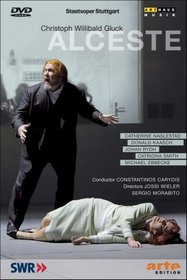| Actors: Catherine Naglestad, Donald Kaasch, Catriona Smith, Wolfgang Probst, Bernhard Schneider Director: Jossi Wieler Genres: Indie & Art House, Music Video & Concerts, Musicals & Performing Arts Sub-Genres: Indie & Art House, Music Video & Concerts, Classical Studio: Arthaus Musik Format: DVD - Color,Widescreen - Subtitled DVD Release Date: 01/30/2007 Theatrical Release Date: 01/01/2006 Release Year: 2007 Run Time: 2hr 45min Screens: Color,Widescreen Number of Discs: 1 SwapaDVD Credits: 1 Total Copies: 0 Members Wishing: 0 Edition: Classical MPAA Rating: NR (Not Rated) Languages: French Subtitles: German, English, Spanish, French |
Search - Gluck - Alceste (Stuttgart Opera) on DVD
  | Gluck - Alceste Stuttgart Opera Actors: Catherine Naglestad, Donald Kaasch, Catriona Smith, Wolfgang Probst, Bernhard Schneider Director: Jossi Wieler Genres: Indie & Art House, Music Video & Concerts, Musicals & Performing Arts NR 2007 2hr 45min This modern-dress staging from Staatsoper Stutgart is exceedingly dull to watch. The chorus on occasion ismade to sing with music stands and is conducted onstage. The grey-walled sets are as drab as can be, while the costu... more » |
Larger Image |
Movie DetailsSimilar Movies
|
Movie ReviewsI found it a captivating production Madbeppo | Dallas, Texas | 10/08/2007 (5 out of 5 stars) "I cannot speak about the sound quality of this dvd, and the video quality is perhaps so-so, but I found the staging concept and realization to be wonderful, ingenious. How better, visually, to present or accompany music that is stately and, no doubt, for many people, at least some of the time, a bit tedious, than by showing people who are manifestly bored, or, if not bored, making an obvious and failing effort to stay alert...exactly as people do at concerts! This is how we see the subjects of Admetus behaving, during the long temple service, and during a symphonic interlude...Delightful! It actually makes the stateliness of the music easier to...enjoy. Meanwhile, the intentionally dull, functional set, and even more the dull costumes, somehow (for me at any rate) made the human drama much more affecting. This queen was a very proper, but unexciting, middle-aged modern monarch; in other words, a real person. This is by far the most moving production of a Gluck opera I have seen on video." Moving ant ridiculous at the same time Vladimiro Rivas Iturralde | México City, México | 07/21/2008 (4 out of 5 stars) "In spite of its "happy ending", Gluck's Alceste is one of the saddest operas of all time. Its subject is death, and the defenselessness of the human being before death. The music has a great nobility and serene beauty.
This Stuttgart production brings for the first time to life the entire Paris version from 1776 score as authorised by Gluck. The production is very moving, but very ridiculous as well. Catherine Naglestad (Alceste) is an atractive woman, a very good singer and a superb actress, so, our eyes and ears are always focused on her. Donald Kaash (Admete) doesn't have a nice tenor voice, but he manages to make his character credible. Johan Rydh is fearful as the high priest and as the Death. Wieler and Morabito have adapted the story to the sixties, but the gods and heroes are unpleasant and ridiculous, particularly Apollo and Hercules. The two children look like little monsters, reminding us the twins in the Kubrick's The Shining. The ending, when Alceste and Admete listen to the orchestral suite, is very ambigous. They don't touch each other any more, and they look at each other as saying: "And now, what? We have defeated the death, and now the boring daily life is waiting for us". The Stuttgart Opera Orchestra performs with period instruments, so the strings are very warm. Constantinos Carydis' conducting is good enough. I recommend it any way. It's worth because the beautiful music and the superb Naglestad." |




![Bizet: Carmen [Blu-ray]](https://nationalbookswap.com/dvd/s/99/9199/209199.jpg)
